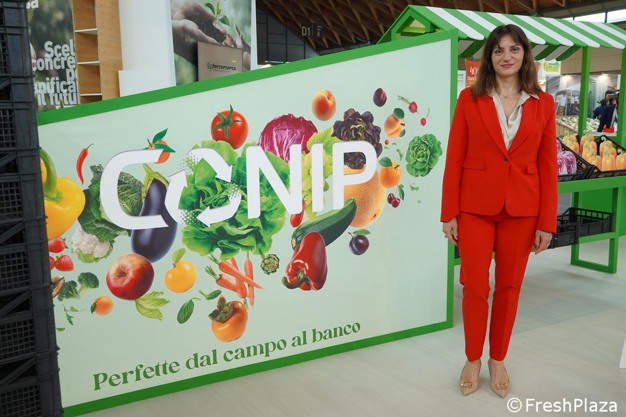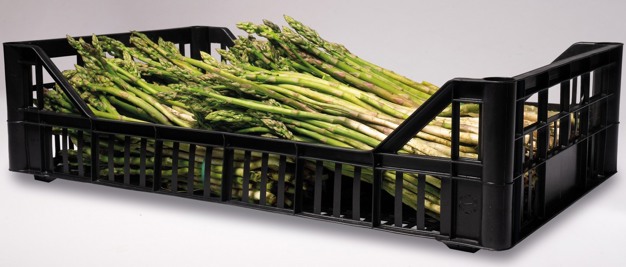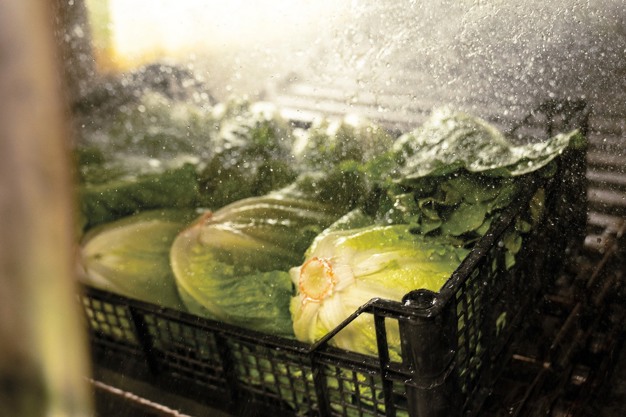Consorzio Nazionale Imballaggi Plastica (CO.N.I.P.) is the pioneer of circular economy, as it has been applying the "closed loop" system for the past 25 years also thanks to the involvement of all actors part of the chain: producers, users, reclaimers and recyclers. The closed loop circuit was designed to promote an eco-sustainable production of crates that is efficient from both an economic and environmental point of view. Such system guarantees the collection of crates at the end of their life, their recycling and the reuse of the recycled material as a second raw material for the production of new crates.

Fabiola Mosca at Macfrut 2023
"For 25 years, the consortium has been working towards circular economy by promoting the use of fully-recyclable recycled plastic crates that are sturdy, lightweight and certified for direct contact with food. Over the years, CONIP crates have become lighter thanks to an improved design, which has led to less secondary raw material being used. The reduced weight of the crates, which has been one of the main prevention measures to contain the environmental impact of the packaging part of the circuit, reached around 30% over the past 25 years. A result obtained without compromising product protection, guaranteed also for long periods, and the functionality of crates especially during palletizing and storage. In addition to the lower quantity of secondary raw material used, CO2 emissions and the energy consumed are also lower during both the production and logistic phases."
The consortium also wanted to tell the community about the important recycling results it reached in 2023 (75%), as well as about the environmental impact of CONIP crates throughout their life cycle, as measured by the Life Cycle Assessment (LCA). "The production of a recycled PP crate emits 75% less CO2 equivalent (CO2e) that a virgin PP crate of the same weight. In addition, the use of fossil non-renewable energy is reduced by 87% while the water scarcity index is reduced by almost 74%. In 2022, the production by CONIP associates of 78,307 tons of "Use and Recover" crates helped avoid the emission of 188,381 tons of CO2e and the consumption of 1,706 Gigawatts, always compared with the production of virgin PP crates. These data are certified by the sector EPD issued in October 2023."

CONIP crates are fully recycled and recyclable and designed specifically for the products they contain
"As regards the release of crates, 2023 registered a further drop of -6.70% compared with 2022. 13,800 fewer tons were issued in 2022 and 2023 compared with 2021. Unfortunately, the ongoing inflation has continued to reduce the purchasing power of Italian citizens who, as a consequence, are consuming less fresh produce (-6% compared with 2022, according to Cso Italy data). The past two years witnesses a 15% decline in the consumption of fresh produce in line with 2018, the worst of the new millennium."
Mosca also stresses that, in addition to inflation, the many extreme weather events have caused the loss of multiple productions, leading to a lower availability of some varieties of fruits and vegetables. "The release of CONIP-branded crates was therefore affected by the consumption trend of fresh produce, but also by the general demonization of plastic of the past few years, which led to various users opting for other materials."
"As for the collection and recycling sector, in 2023 the CONIP system has collected and recycled 75% of the crates released on the domestic territory, an important objective that preempted those established by EU regulations and that is proof of the effectiveness and efficiency of the consortium thanks to the capillarity of collectors/recycling companies."

Over 400 crate models are available, all of which can be customized to meet all kinds of needs
The new EU Regulation on packaging will be approved on April 24th. Mosca is clear about the impact it may have on its associates: "we will be deeply affected, as it envisages that all crates will have to be reusable except if Italy reaches a recycling quota of 55% in 2025, in which case a five-year derogation will be granted. At CONIP, we do not agree with some of the principles on which such Regulation is based, as it imposes a lot of obligations and restrictions for plastic packaging and a lot of exemptions for packaging made of cardboard and other materials."
"The various materials are not treated equally. We can say that it is an anti-plastic Regulation. In addition, the obligation to use reusable packaging instead of a fully-recyclable recycled one, without scientific data proving the actual sustainability of one instead of the other, is truly unacceptable. It questions a recycling system that works and that has led to excellent results so far, compared with a system whose effectiveness and efficiency is still unclear."
For this purpose, CONIP has commissioned a study that will be presented at Macfrut 2024 on the quantification and assessment of the environmental impact of the use and regeneration of reusable crates compared with the impact of the entire life cycle of the fully-recycled "Use and Recover" crates used by CONIP. "The study showed that the closed loop managed by CONIP for 'Use and Recover' crates has a lower impact from an environmental point of view. Results have shown that impact depends mainly on transport, energy consumption and the replacement of missing crates."
The CONIP stand at Macfrut 2023
The consortium will attend Macfrut (Rimini, May 8-10, 2024), in Hall D1-Stand 035. Fabiola Mosca, President Domenico D'Aniello and the entire CONIP staff will welcome guests.
"The fair is one of the main events for fresh produce professionals in Italy and abroad. We have been taking part in it for the past 20 years and we will continue to stress the positive aspects and the advantages of CONIP crates, their characteristics, their peculiarities and the potential of the closed loop circuit."
For further information: Consorzio Nazionale Imballaggi in Plastica
Consorzio Nazionale Imballaggi in Plastica
Via Beniamino Ubaldi snc
Centro Direzionale Prato
06024 Gubbio (PG) - Italy
+39 075 9276702
[email protected]
www.conip.org
